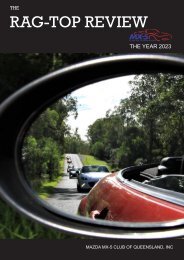Cosmetic Surgery & Beauty #73
Cosmetic Surgery and Beauty is the definitive consumer guide to aesthetic enhancement in Australia.
Cosmetic Surgery and Beauty is the definitive consumer guide to aesthetic enhancement in Australia.
You also want an ePaper? Increase the reach of your titles
YUMPU automatically turns print PDFs into web optimized ePapers that Google loves.
feature<br />
• A seven-day cooling off period before minor procedures<br />
such as injectables for all under-18s and, when needed,<br />
an evaluation by a registered psychologist, general<br />
practitioner or psychiatrist.<br />
• Medical practitioners must personally take responsibility<br />
for post-operative patient care and ensure that there<br />
are emergency facilities when they are using sedation,<br />
anaesthesia or analgesia.<br />
• For patients seeking minor procedures that involve the<br />
use of Schedule 4 medications (such as injectables),<br />
there must be a mandatory consultation with a medical<br />
practitioner either in person or by video consultation.<br />
• Medical practitioners must provide patients with detailed<br />
written information about costs.<br />
How will these changes<br />
affect you?<br />
One of the main points that will affect<br />
prospective patients are the coolingoff<br />
periods. The guidelines provide<br />
a nationally consistent approach<br />
to cooling off periods. They prescribe<br />
a seven-day cooling-off period for all<br />
adults before major procedures (such<br />
as surgery) and a three-month coolingoff<br />
period before major procedures for<br />
all patients under 18 and a mandatory<br />
evaluation by a registered psychologist,<br />
general practitioner or psychiatrist.<br />
The guidelines also introduce a<br />
seven-day cooling-off period before<br />
minor procedures (including cosmetic<br />
injectables) for all under 18s, and<br />
when clinically indicated, evaluation<br />
by a registered psychologist, general<br />
practitioner or psychiatrist.<br />
Associate Professor Stephen<br />
Bradshaw from the Medical Board of<br />
Australia explains, ‘This cooling-off period gives people<br />
some time to consider the procedure. These are sometimes<br />
very major procedures that can be body- and life-altering,<br />
so there is a wide concern that some patients were going<br />
into procedures without knowing the risks, especially<br />
younger people.’<br />
‘Another major concern was that there was no<br />
psychological base and that some people may not have the<br />
maturity needed to make an informed decision,’ he says.<br />
‘We’re not preventing people under the age of 18 from<br />
having cosmetic surgery; we just want to make sure that<br />
they make the right decision. So it’s not about preventing,<br />
it’s about supporting people through it to make sure it’s the<br />
right thing to do.’<br />
The guidelines also prohibit medical practitioners from<br />
providing or offering financial inducements, either to<br />
patients or agents, and prohibit finance schemes being<br />
offered to patients (such as loans or third-party payment<br />
arrangements).<br />
‘We don’t encourage or believe people should take thirdparty<br />
finance arrangements. It’s fine to do it by credit card<br />
and it’s fine to say you can pay in instalments, but finance<br />
companies are not advisable and such an arrangement<br />
would not comply with the guidelines,’ says Dr Bradshaw.<br />
‘We are also concerned that some patients were putting<br />
quite large deposits down even before they decided to go<br />
ahead. Patients shouldn’t be putting down any deposits<br />
until after that cooling-off period.<br />
Nothing should be paid for until the<br />
The new<br />
guidelines are<br />
aimed to help<br />
keep patients<br />
safe, without<br />
imposing an<br />
unreasonable<br />
regulatory<br />
burden on<br />
practitioners<br />
patient comes back and says, ‘I’ve<br />
been to my psychiatrist or I’ve been<br />
to my GP and we’ve discussed it<br />
and I’m still keen to have procedure<br />
X’,’ he says.<br />
Another important aspect of<br />
the guidelines is the requirement<br />
for face-to-face consultations<br />
for doctors prescribing cosmetic<br />
injectables. ‘Consultations can<br />
be done by Skype or video – but<br />
it still needs to be a face-to-face<br />
consultation. It can’t just be a phone<br />
call, etc,’ says Dr Bradshaw.<br />
Patients will benefit particularly<br />
from the improved informed consent<br />
provisions. <strong>Cosmetic</strong> medicine and<br />
surgery are almost always selfreferred,<br />
and there is a greater need<br />
for the stronger informed consent<br />
guidelines announced by the<br />
Medical Board of Australia.<br />
Although cosmetic injectables have become more<br />
common, people should not forget that they are still medical<br />
procedures that require supervision from a qualified medical<br />
practitioner in a safe environment and medical protocols<br />
need to be followed.<br />
Overall, the new guidelines are aimed to help keep<br />
patients safe, without imposing an unreasonable regulatory<br />
burden on practitioners. csbm<br />
www.cosbeauty.com.au 17


















